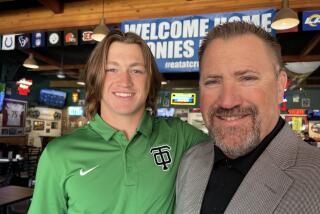Football game is a Polynesian family affair
- Share via
After receiving his first scholarship offer last week from Hawaii, Carson quarterback Justin Alo thanked his extended family for helping him move closer to his dream of playing college football.
“They’ve helped me out a lot over the years,” Alo said. “They definitely made it possible.”
The family Alo actually thanked was his on-field family, a group of hundreds of players and coaches who share a love for football and a common ethnic heritage.
For years Alo has participated in camps and combines run by the AIGA foundation, a nonprofit group that helps players with Polynesian ethnic backgrounds land scholarships. Since 1997, the group has helped dozens of players reach the college ranks, utilizing a network of coaches and college football contacts to train players and get them noticed by recruiters.
“The Polynesian culture is very family-oriented,” said George Malauulu, the foundation’s president, who played at Carson before becoming the starting quarterback at Arizona during the early 1990s. “We look after each other just like an ordinary family does.”
And the “family” had the biggest gathering of its 14-year history Saturday night when more than 60 players from 10 states and American Samoa participated in the Polynesian All-American Classic at Cathedral High in Los Angeles.
Team Black defeated Team White (names based on the color of the jerseys), 21-8, after players on both sides took part in a traditional Maori dance known as the “Haka” before the opening kickoff.
Many of the game’s players are related to current and past NFL stars. Some of them included former NFL great Junior Seau’s nephews Micah and Ian Seau as well as Maika Polamalu, a cousin of Pittsburgh Steelers linebacker and former USC star Troy Polamalu.
While the game gave many players an opportunity to be seen by recruiters a final time before national signing day Feb. 2, it also provided a chance for them to meet and get advice from past and present football stars who share their Polynesian heritage.
Former Pro Bowlers Kurt Gouveia and Dan Saleaumua coached the teams in the classic, working closely with the players during three practice sessions. San Francisco 49ers guard Mike Iupati also was on hand during a pregame function Thursday, offering advice to the players.
“You could tell he wanted to help everyone feel good about the [college] decisions they were going to make,” said Alo, who was born in Hawaii and comes from a Samoan background.
The older generation helping the younger generation is the guiding principle behind the AIGA foundation, Malauulu says.
When he and a group of other former high school athletes formed the organization, Malauulu said, they wanted to create an environment that would apply traditional Polynesian family values to the process of preparing athletes for college. The foundation’s name reflects this goal — the word “aiga” means “extended family” in the Samoan language.
“We understand how difficult the process can be for student-athletes and parents,” said Malauulu, whose organization helps “anyone who asks” regardless of their ethnic background. “We were all there at one point ourselves. … It’s about trying to make things easier by having people who’ve done it before lead the way.”
The number of Polynesian players in the college and pro ranks has steadily increased over the last decade and Malauulu says that has made things easier for Polynesian players who want play after high school.
According to the NCAA 2009-10 student-athlete race and ethnicity report, 1.3% of college football players are of native Hawaiian/Pacific Islander decent, which is roughly a 40% increase from the 1999-2000 season. That’s a large number considering less than 0.2% of Americans claim native Hawaiian or Pacific Islander ancestry, according to 2009 U.S. census data.
“We’re not totally responsible for that, but we’ve been a piece of the puzzle,” Malauulu said.
The foundation hopes to make the Polynesian All-American Classic an annual event.
As for Alo, he was happy to get another chance in front of recruiters with his high school playing days behind him.
“I’ve had a lot of fun this week,” Alo said. “This is a great idea. … I think it’s really going to help players get noticed.”
More to Read
Go beyond the scoreboard
Get the latest on L.A.'s teams in the daily Sports Report newsletter.
You may occasionally receive promotional content from the Los Angeles Times.











